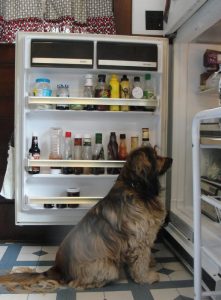
From Dog Cancer Blog
by Demian Dressler, DVM
Why is diet ignored in dog cancer care? To answer that, we have to take a wide-angle view.
Modern medicine is a developing science. Things are changing and expanding all the time. With all of the new information being produced and the fact that it can now be accessed like never before, change is more rapid than it used to be. This knowledge explosion is predictable and has been identified in computer hardware development as Moore’s Law, where the transistor number on circuit boards doubles every 18 months.
Yet in spite of exploding information, we still face significant challenges in dog cancer. There are forces at play which stifle the growth of information that could be useful in treating dog cancer. Some of these include the fact that research has leaned towards reduction (looking at small things instead of larger body systems), peer pressure among researchers to stay within what is accepted (the old ideas) or face ridicule and perhaps career loss, and the tendency of the scientific method to move by branching off existing ideas rather than leap sideways.
Why Isn’t There an Official Dog Cancer Diet?
One of my personal challenges in trying to help people coping with dog cancer is how conventional veterinary care continues to ignore diet as a treatment. For the life of me, I do not understand this.
Even non-veterinarians know that diet impacts physiology, health, and disease. One does not need a fancy degree to be aware of this fact. The evidence is all around us and can be appreciated by having eyeballs, ears, and a brain.
Even if the general public did not know this truth (which they do), veterinary medicine generally acknowledges that diet is important for dog health. We have prescription diets available for many illnesses … but not cancer. We have home-made diet recipes we are trained to provide our clients that are adjusted to fit the new needs of the diseased body … but not for cancer.
We have diets to help:
- treat obesity
- maintain a lean body condition
- dissolve urinary stones
- maintain crystal-free urine
- treat food allergies
- aid in the management of vomiting and diarrhea
- assist in dealing with liver disease
- lower blood toxins in kidney disease
- help with pancreatitis
- support cardiac patients
- decrease inflammation from arthritis and other orthopedic problems
- the brain in dealing with aging changes
We have diets for large, medium, and small breed dogs. We have diets for sensitive tummy and skin..and so on.
But no official diet for cancer.
I’ve made one for dogs with cancer, which is in my book and has been reviewed by veterinary nutritionists. It’s helped hundreds of thousands of dogs. But I have yet to see anything like it be adopted in an official way.
Let’s Think of Cancer as a Chronic Disease
What’s common about all of the diseases above? They are all considered chronic. I think the main reason we don’t have an official diet for dog cancer is that we just don’t think of it as a chronic disease. (To be fair, there was once a prescription diet formulated for cancer, but it never caught on.)
But that’s wrong. Cancer CAN be managed as a chronic disease. It’s not an immediate death sentence!
Dog cancer is the number one cause of canine death, with 1 in 3 dogs contracting it of any age. If your dog is over 10, she has a 50% chance of getting cancer. There are 6 million dog cancer cases annually, according to the Animal Cancer Foundation. Sorry, but with that many patients experiencing cancer, I think we should start thinking of it as something to live with, just like diabetes, heart disease, or allergies.
So, you can help. Ask your vet about diet if you have a dog and you are coping with dog cancer. If your vet does not know, give him a copy of The Dog Cancer Survival Guide or download the free special report on diet, excerpted from the book.
Best,
Dr D
About the Author: Demian Dressler, DVM
Dr. Demian Dressler is internationally recognized as “the dog cancer vet” because of his innovations in the field of dog cancer management, and the popularity of his blog here at Dog Cancer Blog. The owner of South Shore Veterinary Care, a full-service veterinary hospital in Maui, Hawaii, Dr. Dressler studied Animal Physiology and received a Bachelor of Science degree from the University of California at Davis before earning his Doctorate in Veterinary Medicine from Cornell University. After practicing at Killewald Animal Hospital in Amherst, New York, he returned to his home state, Hawaii, to practice at the East Honolulu Pet Hospital before heading home to Maui to open his own hospital. Dr. Dressler consults both dog lovers and veterinary professionals, and is sought after as a speaker on topics ranging from the links between lifestyle choices and disease, nutrition and cancer, and animal ethics. His television appearances include “Ask the Vet” segments on local news programs. He is the author of The Dog Cancer Survival Guide: Full Spectrum Treatments to Optimize Your Dog’s Life Quality and Longevity. He is a member of the American Veterinary Medical Association, the Hawaii Veterinary Medical Association, the American Association of Avian Veterinarians, the National Animal Supplement Council and CORE (Comparative Orthopedic Research Evaluation). He is also an advisory board member for Pacific Primate Sanctuary.








